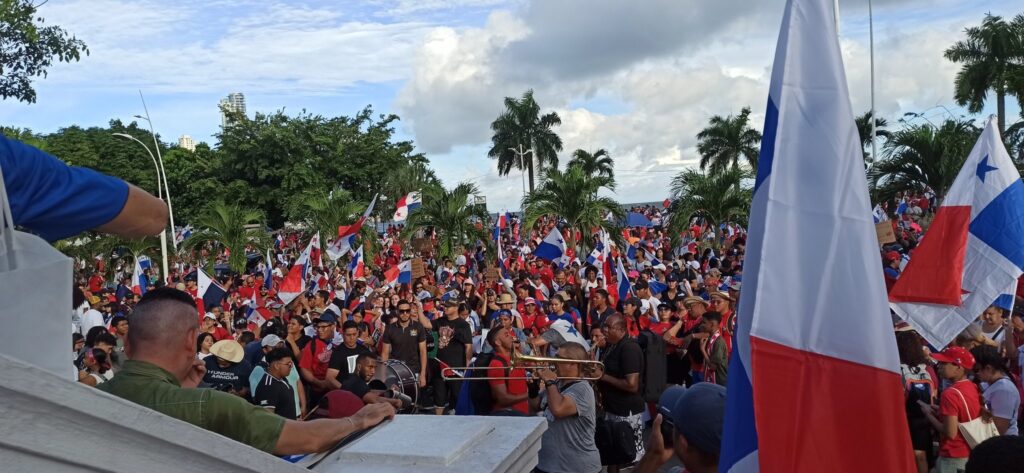|
Getting your Trinity Audio player ready...
|
In October and November of last year, Panamanians took to the streets in record numbers in one of the largest mass mobilizations the country has ever seen, lasting over a month. The protests were in response to an illegal contract between the Canadian mining company, First Quantum Minerals (FQM), and the government that allowed the company to continue operating a controversial copper mine. The main slogan of the protests was “Panamá vale más sin minería,” or “Panama is worth more without mining.”

Today, on the one-year anniversary of the protests, more than 120 Panamanian and international organizations and coalitions delivered a letter to Minister of International Commerce and Economic Development Mary Ng demanding the Canadian government withdraw all support for First Quantum Minerals.
For years, communities in the area have raised environmental and health concerns relating to water contamination and other environmental impacts from the mine. It is located in the Colon region of Panama, which forms part of the Mesoamerican Biological Corridor, an area with rich biodiversity that aims to promote conservation and sustainable development across Central America. Communities and their allies have made repeated demands for the cleanup and closure of the mine to protect key ecosystems and prevent Panama from becoming another country that supplies natural resources without benefiting from their extraction.
FQM acquired the project, Panama’s largest copper mine, in 2013. Just a few years later, in 2017, FQM’s contract was declared unconstitutional. In 2023, amidst the protests, the Supreme Court declared a second FQM contract unconstitutional for not following a legally-required bidding process. The following month, as protests continued and the future of FQM’s operations remained uncertain, the Panamanian government declared a moratorium on all new mining concessions. These decisions upheld Panama’s right to make decisions regarding its territory in alignment with its environmental regulatory system and to protect communities, natural resources, ecosystems and biodiversity.
However, not everyone saw it this way. Since FQM’s contract was canceled for the second time media outlets, such as Reuters, the Financial Times, Bloomberg, the Wall Street Journal and Mining.com, focused on stirring up concerns over what the mining industry, investors, and supply chains will do without access to the copper mined in Panama. The decision from the Panamanian Supreme Court has forced FQM to suspend its operations, but, even a year after the decision, the company has not begun or indicated a desire to close the mine.
Panama’s struggle is happening in the context of an energy transition that claims to be cleaner, while contributing to a growing demand for certain minerals and metals. The energy transition in the Global North, in countries such as the US, Canada, and the EU, relies heavily on a shift from internal combustion engine vehicles to electric vehicles. But electric vehicles have batteries that require vast quantities of minerals, including copper among many others. EVs require about 2.5 times more copper than an internal combustion engine, and demand for copper globally is projected to double by 2035.
These minerals often come from Global South countries, like Panama, and can have serious negative repercussions for already vulnerable groups, such as Indigenous Peoples and women. 54% of mines for energy transition minerals are located on or near Indigenous territories.
A report published in May provides another perspective on the Panama protests. The report details human rights abuses committed against protesters during and after the mass protests. Over 1,500 investigations were opened against protesters, 23 people are still facing charges for their participation in the protests, and there were even five deaths.
As activists, environmental defenders and community leaders continue to face criminalization and the threat of legal charges, the memories of the repression and violence are still present. In May of this year, FQM’s Panamanian subsidiary brought forth charges against three more activists in Colon who led protests against the copper mine.
The fight of the Panamanian people shows that we must support their defense of their sovereignty and territory. As the stories contained in the report, the petition, and the huge number of people who took to the streets last year prove, Panamá vale más sin minería. It is past time for the Canadian government to hold First Quantum responsible for upholding the Panamanian government’s legal decisions and environmental regulations. Furthermore, the Canadian government should not continue to support a company that refuses to safely close a mine that is generating environmental issues.
To support the demand for First Quantum Minerals to respect Panama’s decision to revoke its contract, your organization can sign the petition to Minister Ng.
